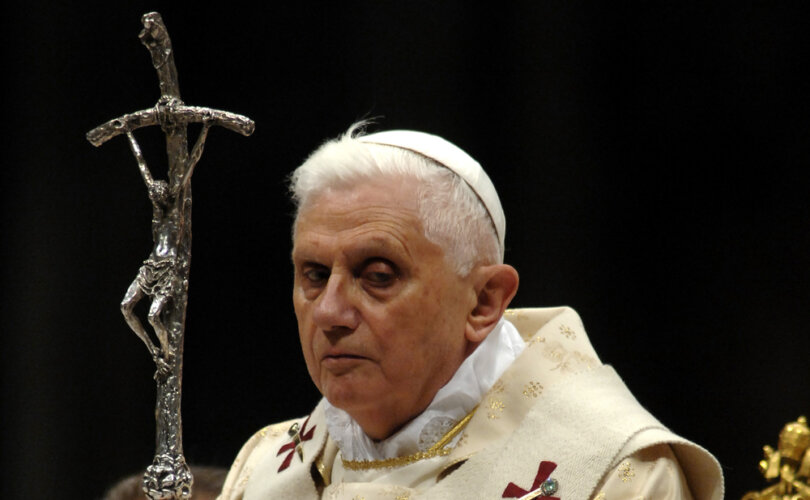VATICAN CITY (LifeSiteNews) — An essay Pope Benedict XVI released in 2019 as part of a Vatican summit on the issue of sexual abuse is at the center of a media storm garnered by its re-emergence in a posthumously published book.
Published only after his death, a book written by the late Pope Benedict XVI is currently causing the mainstream media to give renewed focus on the Vatican, positing the book as a veiled attack upon Pope Francis’ papacy.
Entitled Che cos’e il Cristianesimo (What is Christianity) the book is comprised of a number of separate essays written by Benedict after his 2013 resignation, and has been published only after he died in accord with his express wishes. As recounted in the opening pages of the book, the late pontiff told Elio Guerriero, who compiled the texts, that:
The fury of the circles opposed to me in Germany is so strong that the appearance of any word from me immediately provokes a murderous clamor on their part. I want to spare myself and Christendom this.
Much prominent media attention has been given to chapter five of the book, called “The Church and the Scandals of Sexual Abuse.” Sensationalist headlines have also appeared, as news outlets have described the book as an apparent attack on Pope Francis.
However, chapter five was originally written by Benedict for a high-level series of meetings at the Vatican in February 2019, to address the issue of sexual abuse of minors. As Benedict noted in a brief preamble to his essay, the meetings gathered leaders of bishops’ conferences from around the world.
“Since I myself had served in a position of responsibility as shepherd of the Church at the time of the public outbreak of the crisis, and during the run-up to it,” wrote the late Pope, “I had to ask myself – even though, as emeritus, I am no longer directly responsible – what I could contribute to a new beginning.”
In April that same year, Pope Benedict’s text was published online by a variety of secular and Catholic news outlets, including EWTN and LifeSiteNews.
READ: Pope Emeritus Benedict breaks silence on abuse crisis: full text
The essay, being that which is reprinted in his posthumously published book, does indeed highlight the presence of “homosexual cliques” in “various seminaries” – although contrary to mainstream reports, Benedict did not say this was in light of Pope Francis’ papacy, but in light of “an unprecedented radicalism in the 1960s.”
The late Pontiff wrote:
In various seminaries homosexual cliques were established, which acted more or less openly and significantly changed the climate in the seminaries. In one seminary in southern Germany, candidates for the priesthood and candidates for the lay ministry of the pastoral specialist [Pastoralreferent] lived together.
At the common meals, seminarians and pastoral specialists ate together, the married among the laymen sometimes accompanied by their wives and children, and on occasion by their girlfriends. The climate in this seminary could not provide support for preparation to the priestly vocation. The Holy See knew of such problems, without being informed precisely. As a first step, an Apostolic Visitation was arranged of seminaries in the United States.
Even at the time of its original publication in 2019, the text made waves. Noting the reception of Benedict’s essay, LifeSite’s Dr. Maike Hickson noted that in the responses to the letter, “many German theologians were especially indignant that Pope Benedict criticized the sexual revolution of the 1960s, which they hold in high regard.”
Benedict’s essay also touched upon the question of the Church’s Tradition, and how this was belittled by clerics in positions of power, who were attentive to furthering their understanding of the concept of “conciliarity.”
READ: Pope Emeritus Benedict: Seminarians caught reading my books were thought ‘unsuitable’ for priesthood
“Indeed, in many parts of the Church,” wrote Benedict, “conciliar attitudes were understood to mean having a critical or negative attitude towards the hitherto existing tradition, which was now to be replaced by a new, radically open relationship with the world. One bishop, who had previously been seminary rector, had arranged for the seminarians to be shown pornographic films, allegedly with the intention of thus making them resistant to behavior contrary to the faith.”
READ: Top takeaways from Pope Benedict’s letter on abuse crisis
He also cited a global problem of Catholic bishops who “rejected the Catholic tradition as a whole and sought to bring about a kind of new, modern ‘Catholicity’ in their dioceses.” This was concomitant with his writings, added Benedict, stating that “in not a few seminaries, students caught reading my books were considered unsuitable for the priesthood. My books were hidden away, like bad literature, and only read under the desk.”
The late Pontiff addressed also the issue of a growing lack of reverence for the Holy Eucharist and a general rejection of God in society. This latter point, he wrote, was directly linked to the growth in pedophilia.
Western society is a society in which God is absent in the public sphere and has nothing left to offer it. And that is why it is a society in which the measure of humanity is increasingly lost. At individual points it becomes suddenly apparent that what is evil and destroys man has become a matter of course. That is the case with pedophilia. It was theorized only a short time ago as quite legitimate, but it has spread further and further.
He cited the shocking example of a woman who as a child experienced abuse from her priest. The priest reportedly echoed the words of Consecration before abusing her, as he “always introduced the sexual abuse he was committing against her with the words: ‘This is my body which will be given up for you’.”
Such serious problems affecting both society and the Catholic Church which Benedict highlighted in 2019 are now in the public sphere once more thanks to the republication of the essay in his new book.

